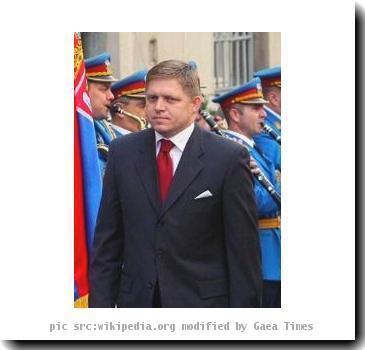Nearly complete results: Center-right opposition is winning in Slovak parliamentary election
By Karel Janicek, APSaturday, June 12, 2010
Opposition winning Slovakia parliamentary election
BRATISLAVA, Slovakia — The center-right opposition came out ahead in parliamentary elections in Slovakia, dealing a blow to a ruling party that had promised to maintain the country’s welfare state as other European countries hack their budgets.
Though Prime Minister Robert Fico’s left-leaning party took the largest share of the vote, the three opposition parties, together with an ethnic Hungarian party, have a majority with 79 seats and could form a ruling coalition.
The Statistics Office said Fico’s party took 34.8 percent of the vote, or 62 seats in the 150-seat Parliament with votes from 5,900 of the 5,929 polling stations counted early Sunday.
Fico’s junior coalition partner, the ultranationalist Slovak National Party of Jan Slota, received 5.1 percent or 9 seats. But, another coalition member, the party of former authoritarian Premier Vladimir Meciar was below the 5-percent threshold needed to win parliamentary representation, marking a possible end for a political career of a former leader who led Slovakia into isolation in the 1990s.
Fico, nonetheless, called the result an “absolute success” that gives him the right to try to form a government.
“If we fail, we will respect a right-wing government, and become a tough opposition.”
The major opposition Slovak Democratic and Christian Union, whose free-market reforms earned the country NATO and EU membership, was second with 15.4 percent, or 28 seats.
Iveta Radicova, its election leader, said talks with the other three parties on forming a center-right coalition will start later Sunday. If they succeed, she has a chance to become the first woman in the post of prime minister.
“The citizens of Slovakia have voted for responsibility,” Radicova said.
The opposition pledged to improve the business environment, create new jobs, reduce the deficit and fight corruption.
Turnout was 58.8 percent, higher than than the record low of 54.7 percent four years ago although some parts of the country have been recovering from a flooding and Slovakia has been hit by a wave of hot weather.
Despite the country’s ballooning budget deficit, the campaign was dominated by debate over a new Hungarian citizenship law, not the economy.
Slota, who is known for derogatory comments about Hungarians and other Slovak leaders, condemned last month’s move by Hungary to make it easier for ethnic Hungarians in neighboring countries, including 520,000 in Slovakia to acquire Hungarian citizenship.
Calling dual citizenship a security risk, Slovakia responded with a law allowing authorities to strip Slovak citizenship from those who become Hungarian citizens.
“It’s a very bad result for Slovakia,” Slota commented.
The country, recovering from an economic downturn, has other pressing problems, analysts said.
Since joining the euro zone in 2009, the budget deficit has ballooned.
The country’s debt, at 41 percent of gross domestic product, is still well below the EU’s prescribed 60 percent. But analysts have warned that a new government may not be able to meet the 2010 budget deficit target of 5.5 percent of GDP. The Association of Economic Analysts predicted this month the deficit could reach 7.4 percent.
The Institute of Economic and Social Studies, a think tank in Bratislava said the major parties have failed to provide concrete plans for necessary austerity measures.
Fico, considered a populist leader, has rejected cutting welfare benefits, as other EU countries, including Britain, have been doing to avert a debt crisis like that of Greece. Instead, he pledged to fight tax evasion and support economic growth.
Fico was a vocal opponent of the U.S.-led war in Iraq and withdrew Slovak troops. He also said he would not allow any part of the Obama administration’s revamped U.S. missile shield planned for Europe to be based in Slovakia.
Tags: Bratislava, Eastern Europe, Europe, Hungary, North America, Parliamentary Elections, Robert Fico, Slovakia, United States

